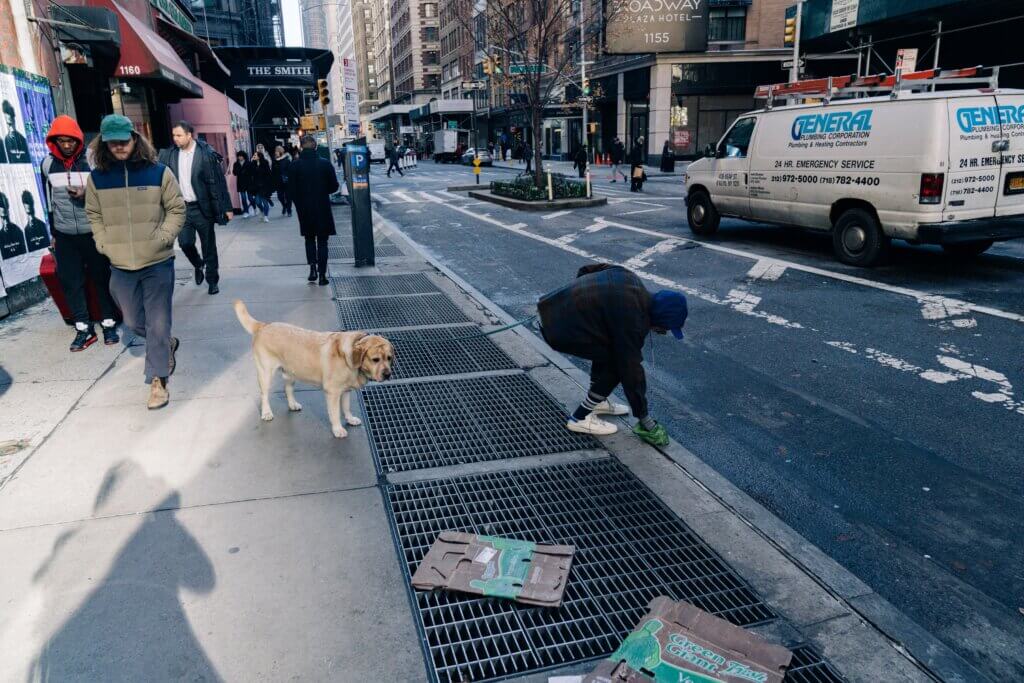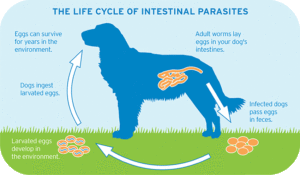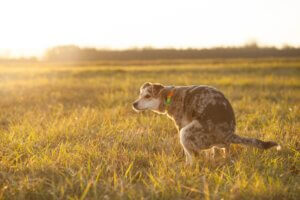All the Different Diseases in Dog Poop

It’s no secret that dog poop is gross, but it isn’t just the stink or look of it.
There are many different diseases in dog poop – several harmful ones that can be passed to humans.
According to The Clean Water Campaign, “Pet waste contains harmful bacteria such as E. Coli and fecal coliform. […] A single gram of pet waste contains an average of 23 million fecal coliform bacteria, some of which can cause disease in humans.”
And that’s not all. There are many types of bacteria, intestinal parasites, and viruses found in dog poop.
What’s worse is that these diseases in dog poop don’t go away with time. The problem grows the longer dog poop lingers in the yard.
Dr. Emily Beeler explains, “Animal owners may mistakenly believe that only fresh, odiferous feces present a health risk. In fact, many parasite eggs found in feces do not reach the infectious stage until days or weeks after the animal defecated. Allowing feces to dry out and disintegrate contaminates the soil and creates an elevated risk for exposure to parasites. Most parasite eggs can remain viable in soil for months or years.”
[Related Read: The Serious Dangers of Dog Poop]
Dog poop doesn’t fertilize your yard – it contaminates it!
Dr. Emily Beeler explains, “Infection happens when tiny amounts of animal stool containing the germs reach the mouth. People may also become accidentally infected when they touch their mouth with soiled hands. Children often have their hands in their mouths and are at higher risk of infection.”
Humans are susceptible to different diseases in dog poop.
To give you a better understanding of the “crap” you’re dealing with, here’s a list of the different diseases in dog poop.
Bacteria
Many diseases found in dog poop are the result of bacteria.
- Campylobacteriosis: Caused by a bacterium called Campylobacter, this bacterial infection is found in dog feces that can be transmitted to humans.
- Salmonella: This bacterium can be found in dog feces and can affect humans.
- Coli: E. Coli is one of the diseases in dog poop found commonly. It causes diarrhea or worse in dogs and humans.
Intestinal Parasite – Worms, Worms, Worms
- Tapeworms: Dogs get tapeworms from eating fleas (or accidentally swallowing fleas) infected with tapeworm larvae.
- Roundworms: Roundworms appear in dog feces and can infect humans who walk or play in areas that have been contaminated by infected dog feces. Emily Beeler adds, “Roundworm eggs can remain viable for years, creating long-term contamination of soil wherever infected feces are allowed to disintegrate.”
- Hookworms: Puppies tend to be more likely to have hookworms. They pass hookworm eggs in their dog poop, leaving eggs and larvae behind in the soil. Then, people can be infected when they walk barefoot.
- Whipworms: Whipworms are intestinal parasites that dogs get by being exposed to soil or other substances with dog poop. Humans can suffer from whipworms if they ingest water or soil contaminated by dog stool that has whipworms.
- Cryptosporidiosis: According to King County, “Cryptosporidiosis is caused by infection with a tiny parasite called Cryptosporidium parvum. The parasite produces cysts (eggs), which are passed in the stool of infected people or animals. The cysts can survive for 2 – 6 months in moist environments and are commonly found in lakes and streams. The parasite is spread by the fecal-oral route. People and animals can get infected when drinking contaminated water or eating contaminated food, or by direct contact with infected persons or animals.”
- Coccidia: These parasites live in a dog’s intestine after a dog eats soil containing coccidia. It is a serious disease for puppies.
- Giardia: This disease in dog poop is spread through dog poop, which means if you don’t clear it from your yard, your dog will keep being reinfected.
Viruses
- Parvovirus: One of the most dangerous diseases in dog poop is parvovirus, which is spread through ingesting contaminated dog poop. It causes severe diarrhea and vomiting and is life-threatening for puppies.
Scoop the Poop!
The most effective way to prevent diseases in dog poop is to scoop the poop regularly. Dog poop is full of bacteria and parasites that are dangerous for dogs and humans. And the longer the dog poop sits in your yard, the more opportunities for bacteria and parasites can grow and spread.
In a Huff Post story, readers learn about a dog named Max. “Max had been suffering sequential bouts of giardia infections before his owners hired Farias-Rios to do his weekly dirty work. ‘A vet had fixed Max up,’ he told The Huffington Post, ‘but then he kept going back out into the yard and catching [giardia] again because the owner didn’t clean up his waste.’”
Unfortunately, diseases in dog poop don’t go away from a one-time scoop.
Sign up for regular scooping service with Super Scoopers to get your yard back to its original, poop-free safe condition.




